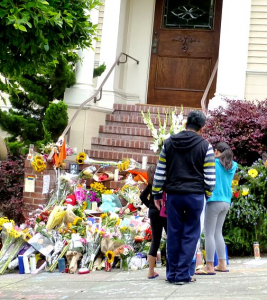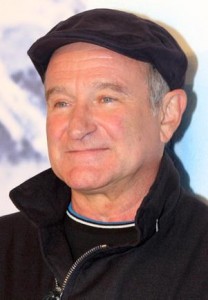Robin Williams - The Face of Inner Pain

It seems nearly impossible to fathom that someone as brilliant and funny as Robin Williams could be so tortured emotionally that he takes himself out of the human race.
Yet, last week, one by one, each of us across the whole globe, fixed our attention on the sad news of this beloved actor’s suicide. Sometimes, a blip of news in the vast sea of information we are bombarded with daily, seems to slap us so hard in the face that we can almost hear the collective groan rippling through space and time. Then we all try our best to reckon with reality. And what a devastating reality Robin Williams’ death reveals – that someone who, by his very nature, brought so much joy and laughter to the world, can host a world of unimaginable inner pain.
The reports say he hanged himself with his belt in his home and was found by his personal assistant. The reports say he suffered from bi-polar disorder, severe depression and addictions. I have never experienced these crippling disorders personally but I know people who do, and you probably do too.
One friend’s saga of depression began when her child was very young, and what should have been a time of busying herself with the happy challenges of raising her little one, turned into a several-year battle for her very life. She’d been prescribed anti-depressants to help with anxiety and when she tried to come off of them all hell broke loose within her. She summed up her nightmare saying that her life spiraled out of control and her depression was so severe that it took every ounce of strength she had most every day for three years NOT to take her own life.
With the support of her family and mostly her pastor, she was delivered from those dark nights of her soul and lived to tell. Today, she is a compassionate warrior for others who battle depression. Her words to me upon hearing the news of Robin Williams’ suicide were, “People need to understand that it’s a disorder. He didn’t do it because he was a coward. He did it because he had deep sadness and probably had an overwhelming compulsion to do it.”
Debbie Brasher, mental health care professional of 35 years in California’s Bay area, was deeply saddened that “Robin Williams had so much access to help and so much love, and still, this tragedy happens.” She went on to say, “We will never know the tipping point for Robin Williams – when the pain of life exceeded all capacity for remaining alive. We can only strive to create communities of support that help individuals and families survive and overcome the impact that these severe mental health challenges can wreak upon their lives.
“This means having open discussions of mental health issues and treatment choices, in particular, for the young adults and eldest among us, who are at very high risk for suicide. It means being a society that doesn’t stigmatize people for needing mental health treatment, so that the shame of having these problems – which is currently a big reason that people do not get help – becomes an artifact of a bygone era when society didn’t fully understand mental health disorders. There are many successful paths for treatment of depression and bipolar disorder, as well as addictions. There is hope.”

One of several fan tributes to Williams, this at the steps of the San Francisco Pacific Heights home used for Mrs. Doubtfire
I think it’s fair to say that we all have someone in our midst that is suffering with bi-polar disorder, depression, and/or addictions. It’s also fair to say that those who have never experienced the ravages of these afflictions can hardly wrap their minds around the lengths that Robin Williams went to escape it. And all of us want to do something to heed the jarring wake-up call we received when we heard the news that our Mork, Euphegenia, Sean Maguire, Dr. Malcolm Sayer, Bob Munro…. wrote his own final chapter.
We are sad, confused, mad, shocked – all at once. We can only let his death serve as a reminder to offer compassion and as much help as we are able to provide for those who are dealing with mental illness. Robin Williams’ public face, those blue, smiling eyes and laugh line-wrinkled mask that we all adored veiled his private anguish. Hopelessness. No one saw it because no human can see that deeply behind another’s eyes.
There are so many resources for help with mental illness, addiction and suicide today. In our region there are countless counselors and medical professionals at the ready to offer support and care. If you, or someone you know, needs help, contact one of the following resources today.
This list merely scratches the surface of helpful, professional resources that are at one’s fingertips for help in dealing with the devastating, wide-reaching effects of mental illness and addiction. Reach out. There is so much love, help, support, prayer, hope and encouragement waiting to surround you, so many hands ready to hold you up and help you along your way.

Robin Williams
Robin Williams was an American actor, comedian, film producer, and screenwriter. Starting as a stand-up comedian in San Francisco and Los Angeles in the mid 1970s, he is credited with leading San Francisco’s comedy renaissance.
After rising to fame as Mork in the TV series Mork & Mindy (1978–82), Williams went on to establish a career in both stand-up comedy and feature film acting. His film career included acclaimed work such as Popeye (1980), The World According to Garp (1982), Good Morning, Vietnam (1987), Dead Poets Society (1989), Awakenings (1990), The Fisher King (1991), and Good Will Hunting (1997), as well as financial successes such as Hook (1991), Aladdin (1992), Mrs. Doubtfire (1993), Jumanji (1995), The Birdcage (1996), Night at the Museum (2006), and Happy Feet (2006). He appeared in the music video for Bobby McFerrin’s song “Don’t Worry, Be Happy”.
Williams was nominated for the Academy Award for Best Actor three times and won the Academy Award for Best Supporting Actor for his performance as therapist Dr. Sean Maguire in Good Will Hunting. He received two Emmy Awards, four Golden Globe Awards, two Screen Actors Guild Awards, and five Grammy Awards.
On August 11, 2014, Williams died of an apparent suicide by hanging at his home in Paradise Cay, California.
Source: Wikipedia.org
Family Counseling Center Inc. 573-686-1200 http://www.fccinc.org
Crisis line: 1-800-356-5395 and there is a crisis worker on call 24/7.
The Missouri Department of Mental Health dmh.mo.gov Suicide hotline: 1-800-SUICIDE (1-800-784-2433) or 1-800-TALK (1-800-273-8255). metanoia.org/suicide
National Suicide Prevention Lifeline http://www.suicidepreventionlifeline.org/
Kneibert Clinic http://www.kneibertclinic.com/service/mental-health/ 686 Lester Street, Poplar Bluff, MO 63901 phone: 573-686-2411, after 5 pm & weekends: 573-778-7228. Toll free at 1-888-81-BWELL
Depression and Bi-Polar Support Alliance http://www.dbsalliance.org
The National Association of Mental Health (NAMI) http://www.nami.org
http://www.fivealive.us Friends Helping Friends Stop Suicide (a site for youth)
http://bipolarthoughtsandsuch.blogspot.com A blog authored by a brave Poplar Bluffian that offers honest insight into her journey dealing with bi-polar
